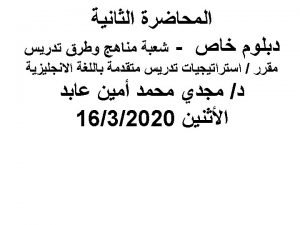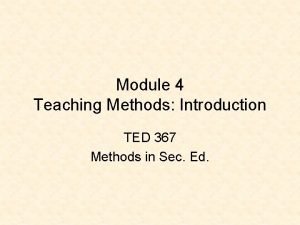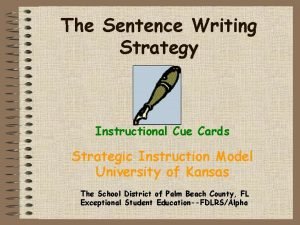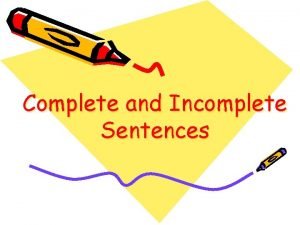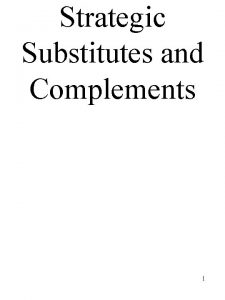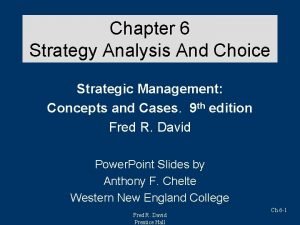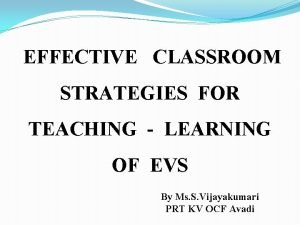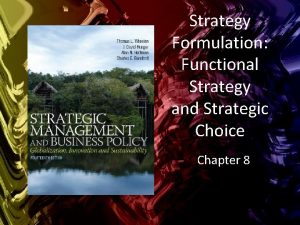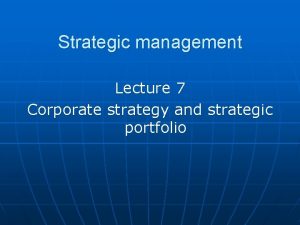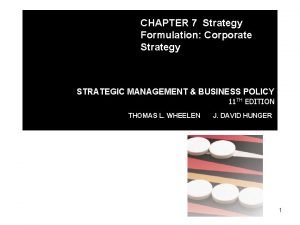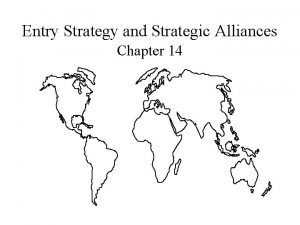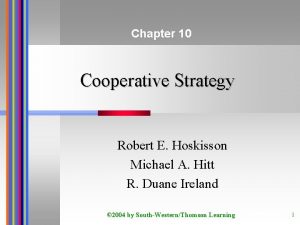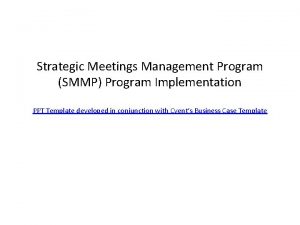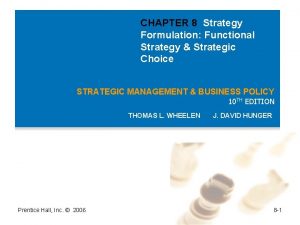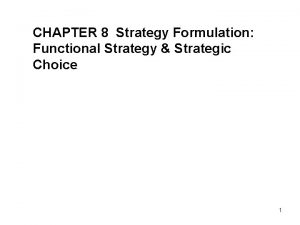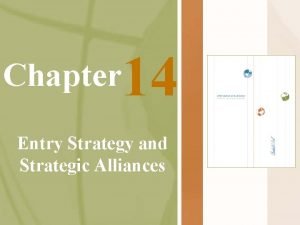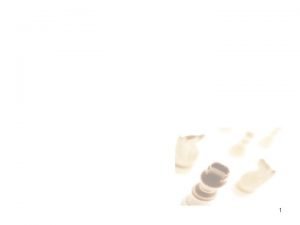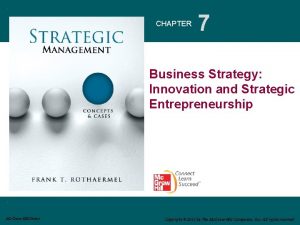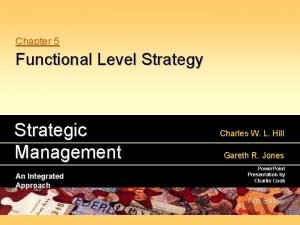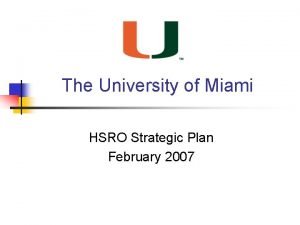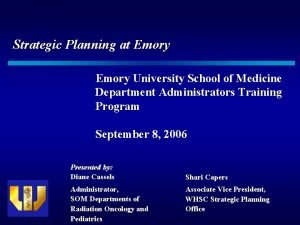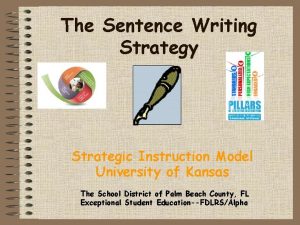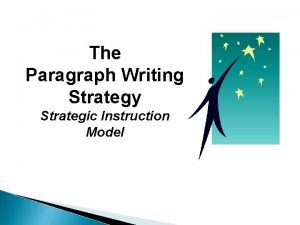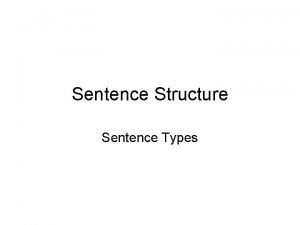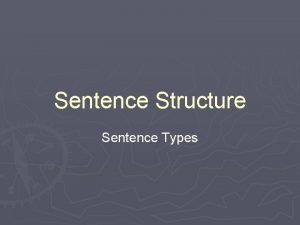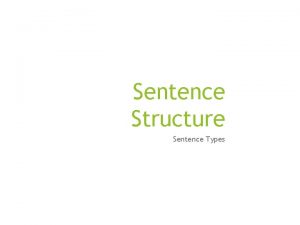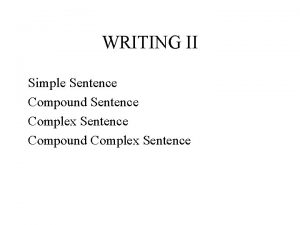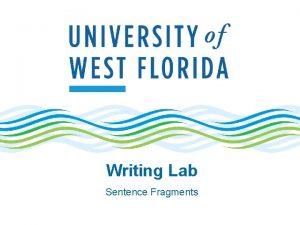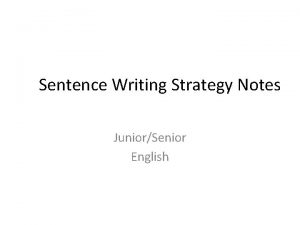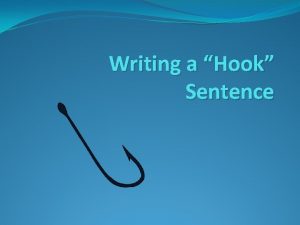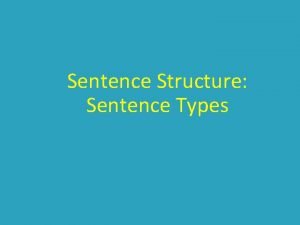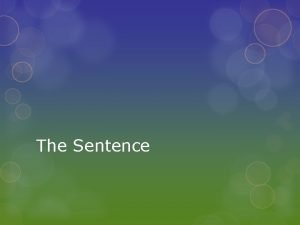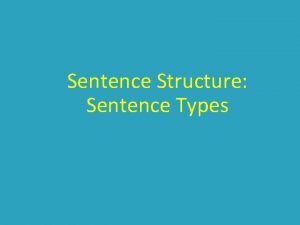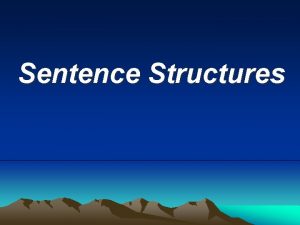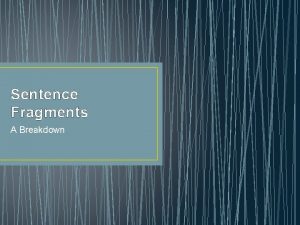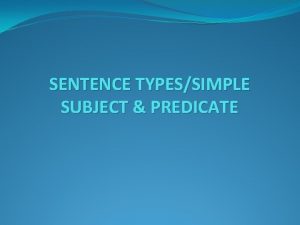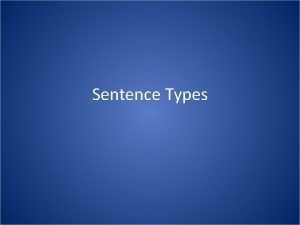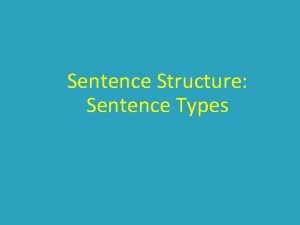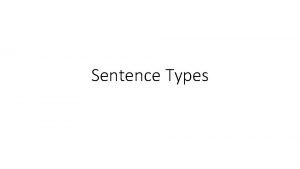The Sentence Writing Strategy Strategic Instruction Model University








































- Slides: 40

The Sentence Writing Strategy Strategic Instruction Model University of Kansas The School District of Palm Beach County, FL Exceptional Student Education--FDLRS/Alpha

OVERVIEW • Pertinent Setting Demands Students must express themselves and demonstrate their writing ability in book reports in creative writing in answers to questions on tests in letters to friends • Purpose of this Strategy To teach students to write a variety of sentences with fluency

The Sentence Writing Strategy Parts of the Instruction Four types of sentences Part I: Simple Part II: Compound Part III: Complex Part IV: Compound-Complex Several types of sentences are taught in each part.

The Sentence Writing Strategy Steps of the Strategy Require students to: Ø utilize formulas to form the sentences they write Ø decide on the correct wording of a sentence before they write it Ø write the sentence using correct capitalization and punctuation Ø check their work Adaptation of Instruction can be adapted across grade levels and to individual or small group instruction

Rationales Behind the Sentence Writing Strategy • Students often do not know how to structure their sentences. The formulas give them structure • Students often do not know how to approach a writing task. This strategy gives them a simple approach to follow • Writing is often a difficult task for students. This strategy helps them learn through structured practice so that they can write more fluently and enjoy writing activities!

Sentence Writing Results Percentage Complete Sentences Pretest 70% Writing Products after Generalization Steps 98%

Learning Strategies Curriculum Expression and Acquisition Word Identification Word Mapping Paraphrasing Fundamentals of Paraphrasing & Summarizing Self-Questioning Visual Imagery Inference Main Idea Storage 1 st Letter Mnemonic Paired Associates LINCS Vocabulary Listening & Notetaking Demonstration of Competence Sentence Writing (2) Paragraph Writing Theme Writing Error Monitoring Edit Assignment Completion Test Taking Essay Test Taking

Instructional Sequence • • Pretest Describe Model Verbal Practice Controlled Practice Grade-Appropriate Practice & Posttest Obtain Commitment to Generalize Generalization https: //www. youtube. com/watch? v=NWv 1 Vd. Deo. RY

Selecting Students for The Sentence Writing Strategy Students must be able to write words (somewhat) legibly in print or script. Students must be able to spell enough words that a sentence can be deciphered by the teacher. Students should be able to discriminate subjects from verbs.

“Give them a fish and they eat for a day. Teach them to fish and they eat for a lifetime. ” Author Unknown

Pretest 1. Choose one topic below. 2. Write a minimum of 6 sentences on that topic in paragraph form. My Favorite Meal My Favorite Vacation Spot The Best Place to Live My Favorite Hobby The Best Job in the World

Complete Sentences !Start with a capital letter !Have end punctuation(. ? !) !Have a subject(S) !Have a verb(V) !Make sense S V. ? !

Sentence Writing Strategy Cue Card #1 Simple Sentence - A sentence that has one independent clause. Independent Clause - A group of words that: (1) makes a complete statement (2) has a subject & a verb

Sentence Writing Strategy Cue Card #2 THE SUBJECT OF A SENTENCE The subject is the: person place Nouns thing quality, or idea that the sentence is about. Examples: John went for a walk. Towns are quiet after snowfalls. Eggs rolled off the counter. Silence is golden. Peace is at hand. (person) (places) (things) (quality) (idea)

Sentence Writing Strategy Cue Card #3 VERB The verb is a word that shows the: action or state of being of the subject of the sentence. Examples: Sally sneezed. John thinks. Jesse is my friend. (physical action) (mental action) (state of being) https: //www. youtube. com/watch? v=Cftcj 9 IYa 1 U

Linking Verbs Words that link the subject to another word that describes the subject. Am Are Is Be Been Become *from Fundamentals of Sentence Writing Was Were Seem

Search & Check Step M ark out imposters - infinitives - prepositional phrases A sk “Is there a verb? ” R oot out the subject - (“Who or What _____? ”) K ey in on the: - beginning - ending - meaning * from Fundamentals of Sentence Writing

Infinitive Usually made up of two words Made up of ‘to’ and an action word (verb) Examples : i Jane likes to camp. i The dog wants to play. * from Fundamentals of Sentence Writing

Prepositional Phrase A group of words that show the place or time (where or when the action takes place) Examples: i p Jane likes to go to the camp. p Kim put the book on the shelf. Hint: Look for a preposition followed by a person, place, or thing (noun) word. * from Fundamentals of Sentence Writing

A Bee Flies _____ the Bottle Above Over On top of On Upon Developed by: Sandy Van Pelt Toward To Around About Through From In Into Across Behind From Out of Out Under Beneath Below Beside By Beyond Between

Prepositions About Above Across After Against Along Amid Among Around At Before Behind Below Beneath Beside Between Beyond By Down During Except For From In Inside Into Like Near Of Off On Over Outside of https: //www. youtube. com/watch? v=yf. Ex. XGMX 2 JM *from Fundamentals of Sentence Writing Past Since Throughout To Toward Underneath Until Up Upon Within Without

Sentence Writing Strategy Cue Card #4 VERB-SUBJECT IDENTIFICATION PROCEDURE Step 1: Look for the action or state-of-being word to find the verb. Example: Kevin reported theft. Step 2: Ask yourself “Who or what (verb)? ” to find the subject. Example: Paula is an astronaut.

Sentence Writing Strategy Cue Card #5 am are • can • could • does • did • has • have • had Helping Verbs is • may • might • must • shall • should • been • being was were • will • would

Sentence Writing Strategy Cue Card #6 Cue Card 6 a Steps For Sentence Writing P ick a Formula E xplore Words to Fit the Formula N ote the words S earch and Check

Cue Card # 6 b Step 4: Search and Check (cont. ) Search: • Look for the action or state-of-being word(s) to find the verb(s). • Ask the “Who or What Question” to find the subject(s). Check: • Capital letter • End punctuation • Makes sense

Search & Check Step M ark out imposters - infinitives - prepositional phrases A sk “Is there a verb? ” R oot out the subject - (“Who or What _____? ”) K ey in on the: - beginning - ending - meaning * from Fundamentals of Sentence Writing


Sentence Writing Strategy Cue Card #7 • Compound Sentence- A compound sentence has two or more independent clauses. Examples: • The students finished class, and they went to lunch. • Kevin did not want to hurt Kathy’s feelings, so he said nothing about her mistake. • I want to see my sister soon, for she has been in Switzerland for two years.

Sentence Writing Strategy Cue Card #8 Comparing Compound Sentences to Simple Sentences with Compound Subjects and Compound Verbs Simple Sentences • The men and women met at the station and went to dinner. • The ducks and geese squawked and fluttered their wings. • Harry and Joe ate ice cream and drank pop. Compound Sentences • The men met at the station, and the women went to dinner. • The ducks squawked, and the geese fluttered their wings. • Harry ate ice cream, and Joe drank pop.

Sentence Writing Strategy Cue Card #9 Coordinating Conjunction--A word that is used with a comma to join two independent clauses. , for , and , nor , but , or , yet , so Examples: • Baseball is my favorite sport to watch, but football is my favorite sport to play. • The children ran all the way to school, yet they were late any way. • You will have to finish the project, or your group will get a failing grade. • Hanni was not at the game, nor was she at the party. • We did not see Mike at the movie, nor did we see him at the restaurant.

Sentence Writing Strategy Cue Card #10 SEMICOLONS Semicolons (; ) can also be used to join the two independent clauses of a compound sentence. Examples: • Susan loves to swim; her brother likes to dive. • Jason was highly respected; he was always such a responsible person. • The meeting was over; it was already midnight.

Sentence Writing Strategy Cue Card #11 Complex Sentence--A complex sentence has one independent clause and one or more dependent clauses. Dependent Clause--A dependent clause is a group of words with a subject and a verb that cannot stand alone. Examples: • I like Sally because she is funny. • Kathy will be late for dinner since the meeting is still in progress. • The game will end when one team scores.

December 25 th

December 26 th

Sentence Writing Strategy Cue Card #12 Subordinating Conjunctions--Subordinating conjunctions are words that show the relationship of the dependent clause to the independent clause. • • • after although as as if as long as as soon as as though because before even if even though if • • • in order that just as like once provided rather than since so that than though unless until • whenever • while

Sentence Writing Strategy Cue Card #13 Sequencing Complex Sentences Dependent Clause First (comma needed): • When I get to Phoenix, you will be sleeping. • After the players practiced, they went out for a pizza. • Until the storm is over, we will not know about the damage. Independent Clause First (comma not needed): • You will be sleeping when I get to Phoenix. • The players went out for a pizza after they practiced. • We will not know about the damage until the storm is over.

Sentence Writing Strategy Cue Card #14 Compound-Complex Sentence-A compound-complex sentence has two or more independent clauses and at least one dependent clause. Examples: • When you are ready, I will call the store, and we can talk to Reed. • Before the trick-or-treaters came, Jill made candied apples; they were delicious.

Sentence Writing Strategy Cue Card #15 a Sequencing Compound-Complex Sentences Dependent Clause First: • After the party was over, Jean had a headache, so Paul cleaned up the house. • Whenever Jennifer feels sad, she calls Chris; he cheers her up. Dependent Clause Second: • Jean had a headache after the party was over, so Paul cleaned up the house. • Chad hates to sleep while his parents are awake, for he might miss something. • Jennifer calls Chris whenever she feels sad; he cheers her up. • The sky was gray when the volcano erupted; ash was falling everywhere.

Sentence Writing Strategy Cue Card #15 b Sequencing Compound-Complex Sentences Dependent Clause Third: • Jean had a headache, so Paul cleaned up the house after the party was over, • The employer made Jill a good offer, and she accepted as long as he gave her a travel allowance. • The doctors were busy with the serious cases; the slightly wounded soldier quietly waited while they worked. • Todd gave an excellent report; his instructor thanked him after the rest of the class left the room.

Implementation • • Schedule Appointment for Implementation Support Collect Pre and Post Test Data Submit to Data to FDLRS Impact Database Complete PD Instructor Evaluation Survey Contact: Julie Drewes Julie. drewes@palmbeachschools. org (561) 434 -8543
 Strategic instruction model
Strategic instruction model Differentiated instruction vs individualized instruction
Differentiated instruction vs individualized instruction Direct instruction vs indirect instruction
Direct instruction vs indirect instruction Fundamentals in the sentence writing strategy
Fundamentals in the sentence writing strategy Example of irrelevant sentence
Example of irrelevant sentence Types of sentences spider
Types of sentences spider Strategic fit vs strategic intent
Strategic fit vs strategic intent Strategic complements and substitutes examples
Strategic complements and substitutes examples Io model strategic management
Io model strategic management Strategic analysis and choice in strategic management
Strategic analysis and choice in strategic management Evs classroom
Evs classroom Managerial process of crafting and executing strategy
Managerial process of crafting and executing strategy What is functional strategy
What is functional strategy What is corporate strategy in strategic management
What is corporate strategy in strategic management Directional strategies in strategic management
Directional strategies in strategic management Entry strategy and strategic alliances
Entry strategy and strategic alliances Cooperative strategy in strategic management
Cooperative strategy in strategic management Strategic meetings management program
Strategic meetings management program Functional strategy and strategic choice
Functional strategy and strategic choice Hit another home run strategy
Hit another home run strategy Market entry modes for international businesses (chapter 7)
Market entry modes for international businesses (chapter 7) Making strategy: mapping out strategic success
Making strategy: mapping out strategic success Strategy
Strategy Functional strategies in strategic management
Functional strategies in strategic management Business strategy innovation and strategic entrepreneurship
Business strategy innovation and strategic entrepreneurship Corporate level strategy types
Corporate level strategy types Howard university strategic plan
Howard university strategic plan University of miami strategic plan
University of miami strategic plan Johns hopkins strategic plan
Johns hopkins strategic plan Emory university strategic plan
Emory university strategic plan Hát kết hợp bộ gõ cơ thể
Hát kết hợp bộ gõ cơ thể Frameset trong html5
Frameset trong html5 Bổ thể
Bổ thể Tỉ lệ cơ thể trẻ em
Tỉ lệ cơ thể trẻ em Gấu đi như thế nào
Gấu đi như thế nào Chụp phim tư thế worms-breton
Chụp phim tư thế worms-breton Chúa yêu trần thế alleluia
Chúa yêu trần thế alleluia Môn thể thao bắt đầu bằng chữ đua
Môn thể thao bắt đầu bằng chữ đua Thế nào là hệ số cao nhất
Thế nào là hệ số cao nhất Các châu lục và đại dương trên thế giới
Các châu lục và đại dương trên thế giới Công của trọng lực
Công của trọng lực

